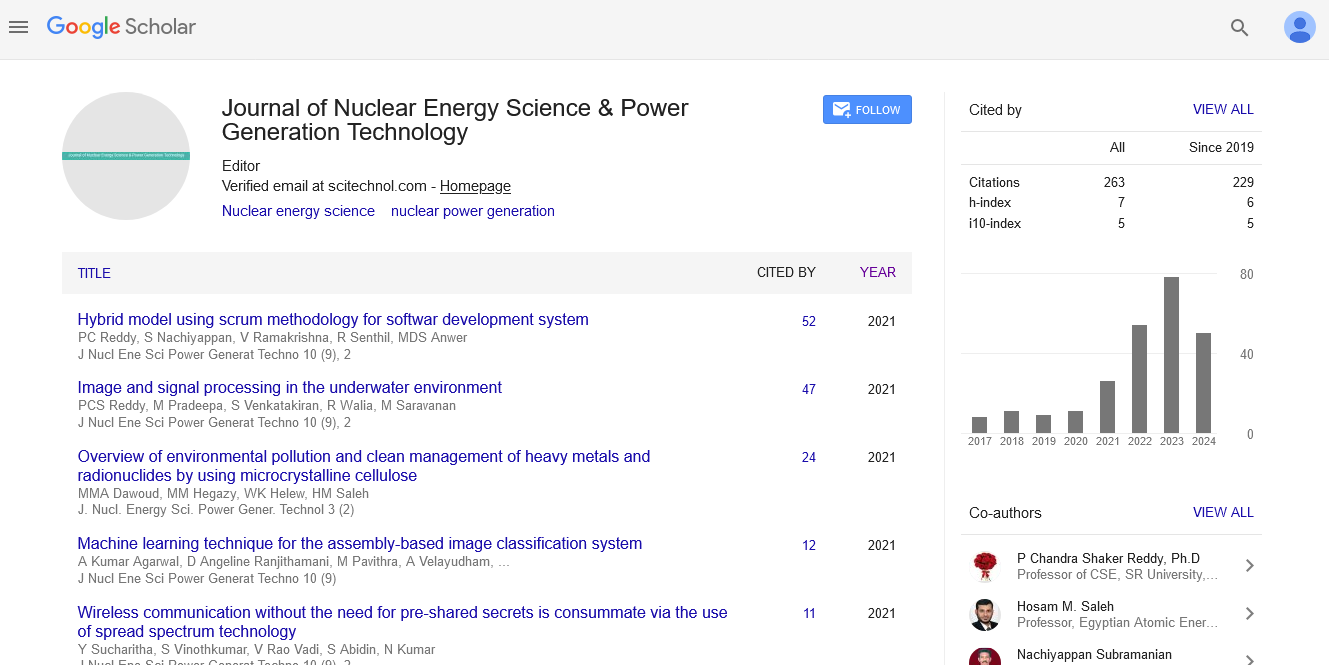Commentary, J Nucl Ene Sci Power Generat Technol Vol: 14 Issue: 1
Carbon Pricing Policy and Energy Efficiency in Canadian Provinces: A Policy Brief
Saheed Bello*
1Energy Policy Research Group, Cambridge Judge Business School, University of Cambridge, Cambridge, UK
*Corresponding Author: Saheed Bello,
Energy Policy Research Group,
Cambridge Judge Business School, University of Cambridge, Cambridge, UK
E-mail: s.bello@jbs.cam.ac.uk
Received date: 12 July, 2024, Manuscript No. JNPGT-24-141532;
Editor assigned date: 15 July, 2024, PreQC No. JNPGT-24-141532 (PQ);
Reviewed date: 30 July, 2024, QC No. JNPGT-24-141532;
Revised date: 06 August, 2024, Manuscript No. JNPGT-24-141532 (R);
Published date: 13 August, 2024, DOI: 10.4172/2325-9809.1000394.
Citation: Bello S (2024) Carbon Pricing Policy and Energy Efficiency in Canadian Provinces: A Policy Brief. J Nucl Ene Sci Power Generat Technol 13:3.
Abstract
This paper examines the effect of carbon pricing on energy consumption which is the main source of CO2 emission to enhance our understanding beyond carbon-pricing effects on households and revenue recycling in the prior research. The study analyses the energy efficiency of Canada using the province-level data between 2000 and 2021, by developing a Stochastic Frontier Analysis (SFA) production model to understand the drivers of energy consumption and then compute the total factor.
Description
This paper examines the effect of carbon pricing on energy consumption which is the main source of CO2 emission to enhance our understanding beyond carbon-pricing effects on households and revenue recycling in the prior research. The study analyses the energy efficiency of Canada using the province-level data between 2000 and 2021, by developing a Stochastic Frontier Analysis (SFA) production model to understand the drivers of energy consumption and then compute the total factor energy efficiency index while controlling for the role of carbon pricing. The empirical results reveal that increased labour input, as well as output, mitigate the rising capital-induced energy consumption, while carbon pricing policy plays no significant role in influencing energy consumption. However, the effectiveness of carbon pricing policy is found in reducing province-level energy efficiency. This striking evidence calls for a comprehensive review of the current carbon pricing policy. Carbon pricing policy, energy efficiency, Canadian provinces, stochastic frontier analysis.
Curbing Greenhouse Gas (GHG) emissions is vital to address climate change. These emissions are mainly due to the substantial consumption of fossil fuels in socio-economic activities. Therefore, imposing fines on fossil consumption is considered an effective measure to reduce emissions. Canada implemented this measure by introducing the Pan-Canadian Framework on Clean Growth and Climate Change in 2016 to reduce emissions by 30% below 2005 by 2030 and achieve net-zero emissions by 2050 (Statistics Canada 2017). The Canadian federal government augmented the emission reduction target to 40% in 2021. Canadian provinces choose their carbon emission reduction measure to meet their specific needs. The flexible carbon measure choice indicates variations in province carbon policies. For example, the fuel charge is used in Ontario, Manitoba, Yukon, Alberta, Saskatchewan, and Nunavut, the output-based pricing system is implemented in Prince Edward Island, Yukon, Nunavut, and partly Saskatchewan . However, energy consumption waste remains a great concern in Canada. Thus, this study examines the impact of carbon pricing policy on energy efficiency in Canadian provinces. The study establishes a novelty by deriving an energy input model from a production function framework, that quantifies the impact of carbon pricing on both energy consumption and inefficiency, while accounting for the cross-sectional dependence among the Canadian provinces. Then, the developed model is implemented to provide answers to the following research questions: How does the energy input relate to carbon pricing, labour, capital, and output? Then, what is the impact of carbon pricing on total factor energy efficiency?
Conclusion
This paper investigates the impact of the carbon pricing policy on energy efficiency in Canadian provinces over the period from 2000 to 2021, using a Stochastic Frontier Analysis (SFA) production model. This model addresses potential policy recommendation bias arising from the assumption of exogeneity and cross-sectional independence. Its results reveal a significant role of production input structure in reducing energy consumption. Therefore, it suggests that existing energy efficiency programs in Canada can be improved by boosting economic activities and engaging more labour participation in order to offset the increased capital-induced energy use. On the other hand, the adverse impact of carbon pricing on energy efficiency calls for a comprehensive review of the current Canadian carbon pricing policy to align the carbon policy measures with energy efficiency programs. Thus, this synergy can fasten Canada's decarbonization achievement.
Acknowledgment
This paper is supported by the UK Research and Innovation (UKRI) funding “UKRI EP/T022930”.
 Spanish
Spanish  Chinese
Chinese  Russian
Russian  German
German  French
French  Japanese
Japanese  Portuguese
Portuguese  Hindi
Hindi 

